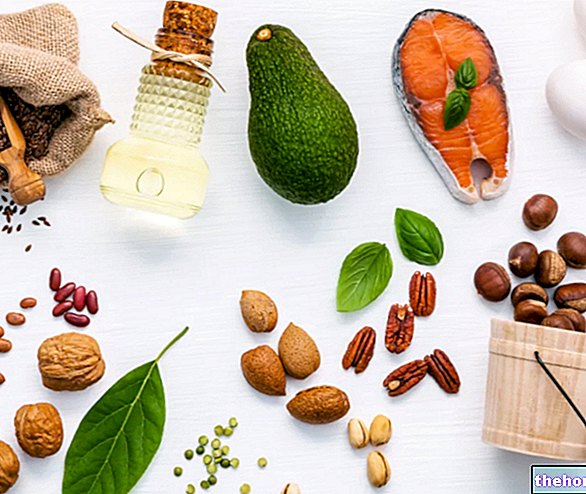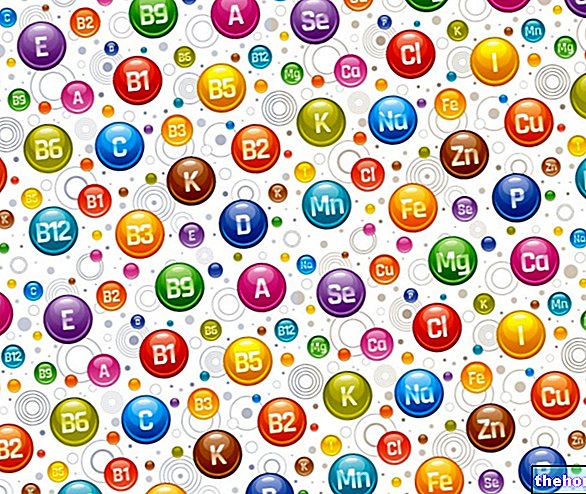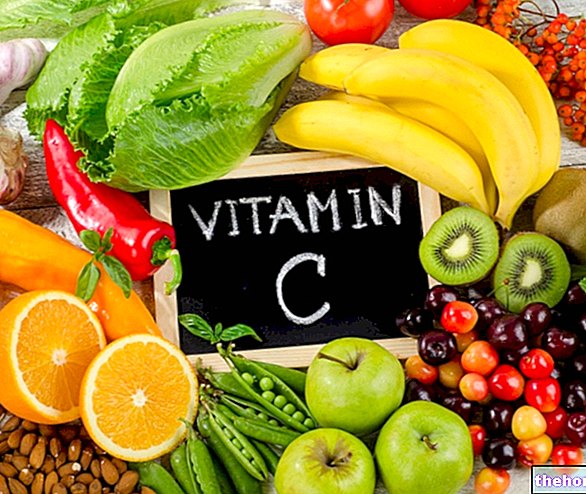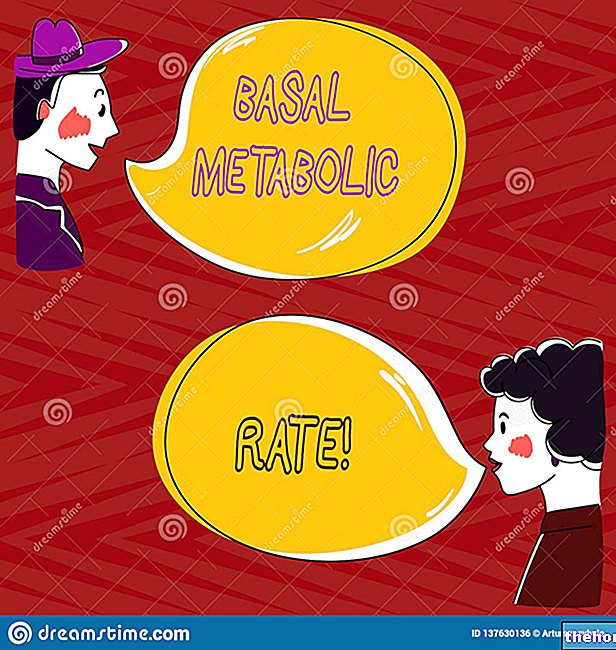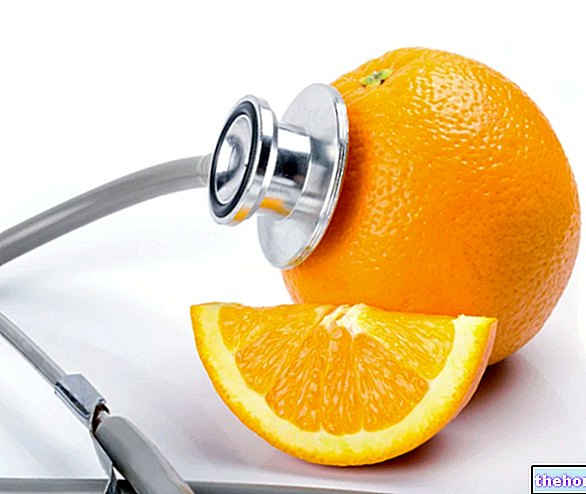Generality
Glutathione or GSH is a natural tripeptide, ie a substance made up of three amino acids, in the order glutamic acid, cysteine and glycine.This particular chemical composition gives glutathione a high ability to oxidize or reduce, protecting proteins and other oxidizable compounds from the deleterious action of free radicals.

Many of these enzymes - whose activity is linked to the presence of selenium - catalyze the neutralization of hydrogen peroxide (a powerful free radical) and other peroxides.
Reduced glutathione (2 G-SH) + Water obs. (H2O2) → Oxidized glutathione (G-S-S-G) + 2 H2O
2 G-SH + ROOH → GSSG + ROH + H2O
As can be seen from the above reactions, the reduced glutathione very willingly gives up its hydrogen (H +), which acts as an acceptor of an electron (e-) coming from reactive oxygen molecules (free radicals).
At this point, once the danger of peroxide has been eliminated, oxidized glutathione must return to its reduced form in order to regain its antioxidant activity; this happens thanks to an enzyme NADPH dependete, called glutathione reductase.
According to numerous scholars, this ability to continuously regenerate has contributed to considering glutathione as the most powerful antioxidant present in the human body.
In healthy cells, the ratio of reduced glutathione to oxidized glutathione remains around 9: 1; its decrease is considered an index of oxidative stress.

Chemical structure of Glutathione (left) and Acetyl Cysteine (right).
Below, chemical structure of the amino acids that lead to the synthesis of glutathione: in the order (from left to right) glutamic acid, cysteine and glycine

In order for glutathione to perform these actions, it is essential that it is supported by adequate quantities of selenium - a mineral that is abundant in foods of marine origin and offal - of riboflavin (Vit. B2) and of niacin (Vit. PP).
Glutathione and Liver Health
Present in the organism in a ubiquitous form, glutathione is particularly concentrated in the liver, where it protects hepatocytes from particularly toxic molecules of exogenous or endogenous origin (generated during the metabolism of some xenobiotics, such as certain drugs, for example paracetamol). in this case, glutathione, once conjugated to toxic metabolites in an enzymatic or non-enzymatic way, cannot regenerate as easily (in part it is eliminated, mainly via the biliary route, and in part it undergoes further metabolisations).
An excessive concentration of toxic substances in the liver can therefore impoverish tissue levels of glutathione, causing severe liver damage. Not surprisingly, in the clinic, reduced glutathione is administered intravenously as a direct and "fast" antidote to "poisoning by paracetamol.
Indications
Why is glutathione used? What is it for?
Glutathione is one of the main protagonists of the cellular antioxidant response.
Concentrated in the cytoplasmic environment, thanks to its particular chemical structure, glutathione intervenes in maintaining the correct state of intracellular redox, acting as a scavenger molecule against oxygen free radicals.
In addition to its strong antioxidant activity, detoxifying, immunomodulating and cytoprotective activities are also attributed to glutathione.
For these reasons, from preliminary studies, supplementation with glutathione would seem useful in case of:
- Diabetes and metabolic diseases;
- Atherosclerosis;
- Respiratory pathologies;
- Loss of hearing;
- Male infertility;
- Heavy metal poisoning;
- AIDS.
From a commercial point of view, by virtue of the great importance attributed to free radicals in the appearance of various degenerative diseases, glutathione supplements are portrayed as a sort of elixir of eternal youth, useful for delaying aging, for strengthening the immune system , to preserve the integrity of red blood cells and the lens of the eye, and to protect the body from ionizing radiation, heavy metals, alcohol, tobacco, drugs and neurodegenerative diseases such as Alzheimer's disease.
Properties and Effectiveness
What benefits has glutathione shown during the studies?
The different biological functions of glutathione seem to support its clinical usefulness.
From various clinical studies, and from numerous experimental studies, the administration of glutathione would seem useful in:
- Protect the liver from the transforming action of potential toxic substances;
- Protect the liver, kidneys and nervous system from the side effects of chemotherapy;
- Reduce the evolution of atherosclerosis by modulating the processes of platelet aggregation;
- Improve the clinical characteristics of oxidative lung diseases;
- Improve insulin profile and activity in patients with diabetes;
- Improve sperm motility and viability in patients with fertility disorders.
limits of supplementation with glutathione
Despite the encouraging clinical evidence, today there are several doubts, especially of a pharmacokinetic nature, relating to the real usefulness of supplementing with glutathione.
All this would be due to the presence, in the intestine, of enzymes known as gamma glutamyl-transferase, which would hydrolyze the glutathione taken orally, drastically reducing its bioavailability.
A strong first pass metabolism and cellular sequestration exerted by the enterocytes of the intestinal mucosa would contribute to further compromising the bioavailability of this nutrient.
For these reasons, integration with glutathione precursors such as N-Acetyl-Cysteine would seem more effective.
Besides being proposed as a supplement with antioxidant and invigorating action, N-acetylcysteine is part of the composition of mucolytic drugs, which, taken by inhalation or orally, facilitate the elimination of mucus from the airways. It is also administered intravenously in the treatment of acute paracetamol intoxication.
Dosage and method of use
How to use glutathione
Glutathione is commercially available as a single ingredient or combined with other molecules with antioxidant activity.
Generally, the suggested dosage of glutathione is between 50 and 600 mg per day, depending on the patient's needs.
In order to enhance the antioxidant activity of glutathione, one could resort to the simultaneous use of other bioactive molecules such as selenium, B vitamins, vitamins A, C or E.
The dosages suggested for an "adequate supplementation with N-Acetylcysteine, in place of the direct one with glutathione, are generally 200-600 mg for 1-3 times a day.
Side effects
The use of glutathione, within the suggested dosages, is generally well tolerated and free from clinically relevant side effects.
Gastrointestinal adverse reactions have been observed very rarely.
Contraindications
When should glutathione not be used?
The use of glutathione is contraindicated in case of hypersensitivity to the active ingredient.
Pharmacological interactions
What drugs or foods can modify the effect of glutathione?
No noteworthy drug interactions are currently known.
However, the administration of glutathione could improve the tolerability of Cisplatin therapy, reducing its side effects.
Precautions for use
What do you need to know before taking glutathione?
The use of glutathione during pregnancy and in the subsequent period of breastfeeding should be carried out, if strictly necessary, only under close medical supervision.

